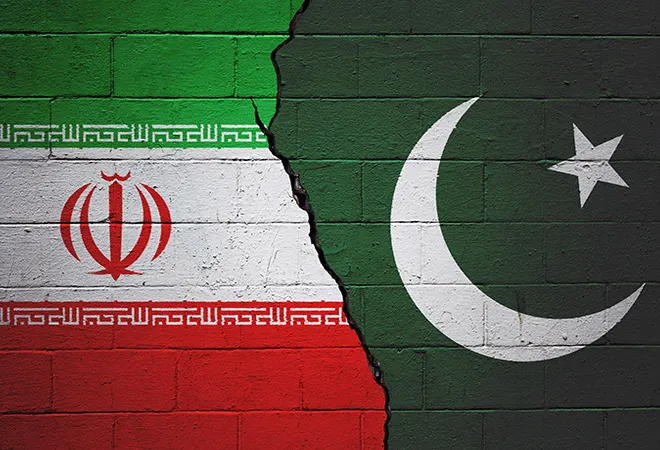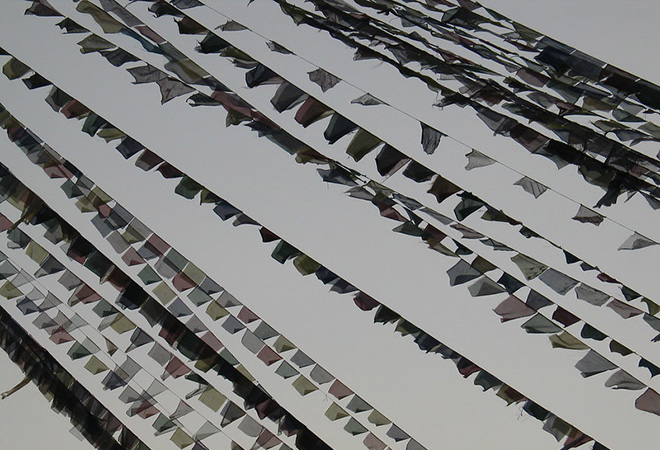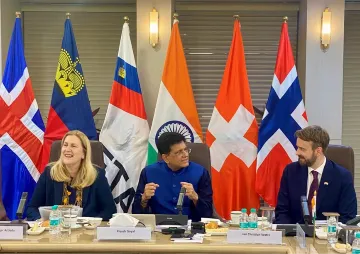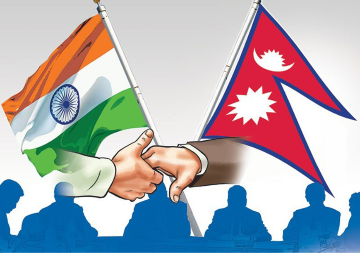News and analyses from South Asia this week.

Pakistan: Behind the cementing of ties with Iran
Ayjaz Wani
On 20 December, Pakistan’s Minister for Defence Production Zubaida Jalal officially opened another border crossing point with Iran to facilitate trade and travel between the two historically-linked countries. The minister also inaugurated an immigration office at the new Gwadar-Ramdhan entry point, about 130 km from the strategic Chabahar port in Iran, being built by India. The crossing is suitably located for bilateral import and export of fruits, construction material, livestock and petroleum products.
The opening of this crossing was finalised during the visit of Iranian Foreign Minister Dr Javad Zarifto Pakistan on 12 November. As per the agreement, more border crossing points will be opened in the near future. Speaking on the occasion, the minister said that the opening of another international border crossing-point underlines the strengthening bilateral ties and increasing economic activities.
Chinese influence
This cementing of bilateral relationship among the two neighbouring countries is an outcome of the growing Chinese influence over the region, which has also been one of the principal reasons for the bittering of the Pakistan-Saudi relationship.
China has increased its influence over the region through both economic, security and geo-strategic deals with these two countries. Ties between China and Pakistan, that have blossomed into an “all-weather friendship”, date back to the 1960s when Islamabad helped the Chinese Communist Party (CCP) to gain favour in West Asian countries. In recent years, Beijing announced the controversial and sensitive China Pakistan Economic Corridor (CPEC) and invested over $62 billion in infrastructure and energy projects Pakistan. The CPEC provides alternative pathway for exports and energy imports to China’s western provinces from West Asia through Gwada -- the gateway of Asia. The weakening of Pakistan’s economy has enabled China to use Islamabad to checkmate western democracies on many global forums for human rights violations against the Uyghur Muslims living in Xinjiang.
The relations between the US and China seem to be going into a deep freeze amid trade war, South China sea disputes, brawls on technology like 5G and Huawei etc. Iran too is facing worst economic sanctions after US President Donald Trump’s withdrawal from the Iran Nuclear deal in 2018. The new stringent sanctions by the Trump administration and the unilateral actions without consulting other signatories of the nuclear deal crumbled Iran’s economy. The assassination of Maj-Gen Qasem Soleimani in a drone-strike by the US near Bagdad International Airport fanned further hostilities.
Against this backdrop, the increased convergence between Iran and China over the past three years has made considerable progress in recent times. As the US was facing internal political difficulties and was grappling with the Covid-19 pandemic, Beijing recalibrated its strategy towards Iran. In July 2020, the two countries were in the final stage of a massive $ 400- billion deal. which include economic and security deals, free trade zones, airports, highspeed railways, subways, ports, telecom infrastructure to be built through Chinese investments. Beijing will get cheap oil and gas supplies besides deepening the strategic links. Pakistan, which shares its border with both China and Iran, has sensed its own benefit by improving its relations with Tehran. The emerging scenario can also aid regional integration.
Bitter ties with Saudis
The souring relationship between Pakistan, Saudi Arabia and the UAE is also the reason for Islamabad warming up to Tehran. Pakistan Foreign Minister Shah Mehmood Qureshi in August 2020 criticised Saudi Arabia-led Organisation of Islamic Cooperation (OIC) for not convening the meeting of its Council of Foreign Ministers (CFM) on Kashmir.
Saudi Arabia forced Pakistan to repay the loans under the Saudi financial package ahead of schedule. The financial package of $ 6.3 billion included $ 3 million cash and USD 3.2 billion deferred payment on gas and oil supply. The Saudi government suspended oil facility on deferred payments and even forced Islamabad to pay the other $ 3 billion and the interest ahead of the schedule.
Cornered, the economically-beleaguered Pakistan rushed to get a $ 2.5-billion loan from Beijing, with an additional $ 1 billion to be paid in January 2021. Saudi Arabia also started a drive to send workers without valid documents back home irrespective of their nationality but most of them are from Pakistan. The UAE on the other hand recently halted issuing visas to nationals of 13 Muslim countries, including Pakistan, for its criticism on OIC.
In this background, Pakistan’s cementing of relationship with Iran may work in two ways. First, warm relations with Tehran will help Pakistan access the much-needed cheap oil and gas supply that it badly needs for industrial development and consumption. Iran has completed the construction of a pipeline till Pakistan’s border. However, Pakistan could not complete the pipeline because of its own crippling economy and the US sanctions. Second, as both Saudi Arabia and the UAE feel Iran is now the bitter enemy than Israel in the West Asia, Pakistan’s tilt towards Tehran is sending a strategic signal to both the Gulf nations that Islamabad wants to use Iran as a bargaining chip.
The new US President-elect Joe Biden and his administration is expected to re-engage with Tehran on the nuclear issue. However, there are chances of increased Pakistan-Iran bonhomie under Chinese influence that can be counter-productive for India, in the long run, especially in the Greater Central Asian region. New Delhi should revive its engagements with Iran, both economically as well as politically, to stop the nefarious designs of the Chinese in the region. Furthermore, India should invest more in Chabahar to create its own opportunities in the region both for geo strategic and economic purposes.
Nepal: Political crisis leading to emergency elections
Sohini Nayak
 Cezar Martins — Flickr/CC BY-NC 2.0
Cezar Martins — Flickr/CC BY-NC 2.0
The fragile political system of Nepal is yet again in strains with the emergency dissolution of the country’s Parliament, the House of Representatives. The dissolution, recommended by Prime Minister, K. P Sharma Oli, has been ratified by President Bidya Devi Bhandari. Prime Minister Oli’s this bold step follows the intra-party squabble within the ruling Nepal Communist Party (NCP) with the PM facing the threat of a no-confidence motion in the House, by the faction led by party Chairman Pushpa Kamal Dahal, along with the impeachment of the President.
Consequently, the Himalayan nation has been in a political furore, especially with the Dahal faction terming the dissolution ‘unconstitutional’. Not only did many ministers step down from their positions, describing the development as going against the ‘popular mandate’ of the 2017 general elections, repercussions are also felt in the country’s main opposition party, the Nepali Congress, which is also having differences within, on their having to be ready for elections, if held in the near future.
It must be mentioned here that Oli has also been removed as the Chairman of the NCP by the Central Committee of the party, leaving him on the side-lines as the country awaits its future in keeping intact the democratic nature of governance. His place has been taken by former Prime Minister Madhav Nepal, who along with Dahal has asked the Election Commission to grant official recognition as the NCP, as they hold two-thirds majority in the now integrated Nepal Communist Party. They have also tried to establish themselves as the only legitimate Nepal Communist Party in the country.
In such a situation, the parties to the dispute are left with only two choices -- either to fight a legal battle in the apex court or to hold fresh mid-term elections that might happen in April next year, as has been declared by the President. There is a real possibility of a change in the government leadership.
Prevailing lawlessness
Since 1990, no Prime Minister in Nepal has been able to sustain a government for a fully elected term of five years. With the present unilateral move, the basic fracture in the country’s political framework is once again in the limelight, threatening the democracy. It must be noted here that one of the several reasons why the Oli government has been attacked is his demeanour towards the Constitutional Council Act.
PM Oli has been held responsible for the promulgation of an ordinance for amending the Constitutional Council Act (Functions, Duties, Procedures), 2010, thereby showing an authoritarian fervour. The President has also supported and promulgated the ordinance, wherein consensus generation will supposedly remain a myth in the country, where even the presence of only three members would be considered enough for the commencement of a meeting or taking vital decisions.
In reality, the Constitutional Council is a six-member body which includes the Prime Minister, the Chief Justice, the Speaker, the Deputy Speaker, the National Assembly chair and the leader of the main Opposition that appoints the constitutional bodies, judiciary and foreign missions. Since Opposition leader Sher Bahadur Deuba and Speaker Agni Sapkota were not present while the ordinance was passed, it has been termed as unlawful.
The Supreme Court has also issued a show-cause notice to PM Oli and his government, asking them to cite the exact reasons behind the abrupt decision. A five-member constitutional bench was created, headed by Chief Justice Cholendra Shumsher Ranaon, after those opposed to the dissolution decision filed writ petitions, challenging the President’s order.
Worsening situation
In fact, sensing the worsening of the situation, the Nepal Army Headquarters has taken note of the prevailing tension in the country and have begun anticipating violence. The Home Ministry has also advised the Nepal Police, the National Intelligence Department and the Armed Police Force to remain alert and keep a keen eye on the developments as widespread protests are taking place all around.
The involvement of India in this entire issue has attracted global attention as well, not going down too well with the southern neighbour. Oli has been quoted as saying that India holds the intention of ousting him from his position, after the cold row that Nepal had with its neighbour over the Kalapani- Lipulekh- Limpiyadhura political map issue. Nonetheless, India has reacted to this claim as an ‘internal issue’.
Another important neighbour, China, is also equally interested in the matter as it wants the NCP to remain intact and in power. Again, sandwiched between the seemingly power tussle between the two South Asian giants, who are motivated by their own interests, the situation in Nepal is worsening. It is not clear whether this situation is because of the play of any external player/s. The country itself is torn apart because of the clashes of opinion of the ruling party leaders. Only coming days will tell how the new political feud will impact the country and how it will affect the South Asian geopolitics.
Country Reports
Afghanistan
Poll monitor shot dead
Yousuf Rasheed, the executive director of the election monitoring body, Free and Fair Elections Forum of Afghanistan (FEFA), was shot dead in a Kabul neighbourhood. Rasheed was on his way to the office with his driver who was also injured in the attack when their car was ambushed. No one has claimed responsibility for the attack and the Taliban have denied their involvement. The incident has drawn condemnation from President Ashraf Ghani and the US, which mentioned through a statement that the future of Afghanistan shouldn’t be ‘foreclosed by murder’ but rather be solved at the negotiating table.
Baradar’s Pak visit stirs row
Taliban deputy leader Mullah Baradar and the members of the Taliban’s negotiating team recently visited Pakistan after the talks were paused for 23 days for the members to have conversations around the agenda before the next round. A video circulated on the social media showed Baradar making a statement that all the decisions in the peace process are taken in consultation with the Taliban leadership and the Taliban’s cleric council in Pakistan. The Ministry of Foreign Affairs issued a statement stating that the presence of Taliban fighters in Pakistan is a violation of 'Afghanistan’s national sovereignty’. The Taliban on the other hand said that Baradar was meeting with patients and Afghan refugees in Pakistan.
Bangladesh
Up in Human Development Index
Recording an impressive growth in human development the country has moved notches up in the Human Development Index published United Nations Development Programme. The country was able to improve its position due to impressive progress made in life expectancy, per capita income, and other socio-economic areas. In the recent Human Development India Bangladesh is ranked 133 amongst 189 countries. Bangladesh, however, is behind 4 South Asian including Sri Lanka, Maldives, India and Bhutan in the index.
Soon to purchase ultra-modern fighter planes
Prime Minister Sheikh Hasina has informed that the government will be buying ultra-modern and high-performance fighter planes. Prime Minister announced while virtually addressing the President parade 2020 of the Bangladesh Air Force (BAF) this. Prime Minister further declared that BAF is all set to acquire air defence system integration, unmanned aerial vehicle system, mobile gap-filler radar and ultra-modern air defence radar.
Visit of Turkish Foreign Minister
Turkish Foreign Minister visited the country this week. During the visit, he had called on Foreign Minister A.K. Abdul Momen and Prime Minister Sheikh Hasina. The two countries have expressed interest in deepening cooperation in a wide range of areas from trade to defence.
Bhutan
Bid to revive hydropower
The government has been trying to refurbish the economy by focusing on renewed efforts for hydropower development, amidst the pandemic. Economic Affairs Minister, Loknath Sharma, explicitly said that this sector is one of the vital ways of garnering back the lost economic prowess of the country. There are major hydropower projects that have been stalled but now must progress again. Two of the crucial ongoing ones are Punatshangchu I and II in Wangdue, and Nikachhu in Trongsa. It will also cost millions of ngultrums. The dzongkhag taskforces are also trying to do its best to bring back the lost GDP. The country must make an extra effort on this front as it is not only a top priority for utilizing its resources but a source of income generation as well.
India
PAGD
In the District Development Council (DDC) polls in Jammu and Kashmir, held this month, the first ever democratic exercise after the abrogation of Article 370 and the creation of the former state into a Union Territory, the People’s Alliance for Gupkar Declaration (PAGD), the Farooq Abdullah-led seven-party coalition, which comprises parties like National Conference (NC)and People’s Democratic Party (PDP) led by Mehbooba Mufti, won 110 seats. The BJP has, won 75 seats after securing the largest vote-share in the polls. The Congress won 26 seats.
JJM in 3-crore households
The Union Government’s scheme called Jal Jeevan Mission (JJM) which seeks to provide drinking water to every rural household in India by 2024 has achieved 32.3 coverage of its target. Director of JJM, Bharat Lal revealed that the scheme which was rolled out in August last year has so far managed to provide water tap connections to 3 crore rural households in India.
Maldives
Four more islands for lease
The government is planning to lease four more islands from as many atolls for tourism purposes. The tourism ministry said that the four islands will be leased from as many atolls, and their names will be announced soon. Under the predecessor Tourism Minister Ali Waheed, set out in 2019, the list comprised as many as 29 islands. The government estimates that the new islands, once developed will come with a bed capacity of 13,720.
‘Great invisible tsunami’
On the occasion of the anniversary of Asian tsunami 2004, observed as National Unity Day, on Saturday, 26 December, Foreign Minister Abdulla Shahid described the COVID-19 pandemic as a great tsunami invisible to the naked eye that continues to devastate the world. He likened the devastation left in the wake of the tsunami to that of a battle field. “I saw our houses and buildings crumbled and our islands devastated. I saw at close hand the tears streaming down the eyes of Maldives on that day,” he said and attributed Maldives’ success in overcoming the devastation to the unity and solidarity shown by the people. “I would not be untrue to say that never in the history of Maldives have the people been so united as when the Maldivian people had faced that great wave,” he said, adding, “Today, we salute them all,” he said.
Myanmar
Unhappy with Chinese fences
China’s construction of fences near border posts between Myanmar and China are opposed by Myanmar. Eight fence posts on the Chinese side do not comply with the two countries' border agreement that was signed in 28 January 1960. On 22 November last year, they had protested against Chinese construction of fences, crossing the border, near border post BP-125 in Laukkai Township in the Kokang Self-Administered Zone (SAZ). To prevent the spread of the Covid-19 virus and illegal crossings, the Chinese side has erected fences around the border with Myanmar, with temporary barbed wire fences as well as reinforced structures.
Nepal
China seeks to intervene
Amidst extreme political fragility in the country, China is sending a high-level delegation, led by Vice Minister of the International Department of the Communist Party of China, Guo Yezhou, to Kathmandu. With the dissolution of the House of Representatives by Prime Minister K. P Sharma Oli, China is wary of the upcoming and evolving political situation in Himalayan country that has always been extremely instrumental in curating its relationship with giants like India. This visit is also in line with similar high-level exchanges from India in the recent past. China is seemingly not in support of the split in the Nepal Communist Party (NCP) and has been trying its best to restore back political stability in the country through its representative in Nepal, Hou Yanqui, the Chinese Ambassador to Nepal.
Pakistan
Beijing seeks guarantees
Due to the weakened financial position of Pakistan, China, before sanctioning $6 billion loan for Main Line-1 infrastructural project, has sought additional guarantees from Islamabad. The issue of additional guarantees was raised during the third joint meeting of the ML1 project. The ML1 project includes upgradation and dualisation of the 1,872 KMs of railway line between Karachi and Lahore. It is pertinent to mention here that Beijing from last six months has halted many CPEC flagships projects due increased political volatility and precarious economic conditions, worsened because of the pandemic.
Sri Lanka
French aid total 172 Euro
The Agence Francaise de Development Group (AFD), the development bank and cooperation agency of the French government, has extended a loan of 172 euro, repayable in easy instalments for implementing specific projects in Sri Lanka. The projects include irrigation schemes, including flood-control measures and drinking water provision, especially in Trincomalee and Batticaloa in the East, after consultation with local farmers, local Bishops and the Eastern University. In addition, the initiative will cover the construction of four grid substations, supplementing the national grid through renewable power generation, micro hydro plants and also cheaper green power. Green power development co-financed by the Asian Development Bank, together benefiting 146,000 families in the eastern part of Greater Colombo.
Pressure over burial issue
With the UNHRC set to debate and vote on allegations of human rights violations, especially war-crimes, in the country in its March session, pressure is said to be mounting on the government of President Gotabaya Rajapaksa not to precipitate the issue pertaining to the denial of burial rights for the Covid dead from the nation’s Muslim community. Former Prime Minister Ranil Wickremesinghe urged the government not to keep dilly-dallying over the issue more than already while the Opposition SJB too has joined the Opposition chorus. There have also been suggestions that the government should resolve the issue early on, considering that the Islamic nations’ support for the UNHRC resolution will be a key factor at the UNHRC. As critics point out, Sri Lanka is the only country in the world, whether Buddhist, Islamic or Christian, to have banned the burial of Covid dead while the World Health Organisation (WHO) has ruled out contamination of ground water.
Bibliography
Afghanistan
Opinion Pieces
Franz J. Marty,’Fire from the Sky: The Afghan Taliban’s Drones’, The Diplomat, 22 December 2020
Wasil Ahmad Akhtar, ‘Aid could and should produce better results’, Afghanistan Times, 23 December 2020
Editorials
Afghanistan Times, ’Taliban views on Girl’s education’, 22 December 2020
The Daily Outlook Afghanistan, ‘Holding Out against Ceasefire Indicates Taliban’s Insincerity’, 24 December 2020
Bangladesh
Opinion Pieces
Syed Yusuf Saadat, “Covid-19 and SDG 8: Reviving economies, restoring livelihoods”, The Daily Star, 25 December 2020
Manas Nag, “Bangladesh’s Dangerous Islamist Appeasement – And What It Portends”, The Diplomat, 22 December 2020
AKM Zakaria, “Does no one have any interests in Bangladesh?”, Prothom Alo, 19 December 2020
Pinak Ranjan Chakravarty, “Islamist agitation and sculpture politics in Bangladesh”, The New Indian Express, 19 December 2020
Bhutan
Editorials
Kuensel, “All in the fight together,” 26 December 2020
Kuensel, “Fighting fake news,” 23 December 2020
India
Opinion Pieces
Faizan Mustafa, “Article 356 and an activist judiciary”, The Hindu, 26 December 2020
Chakshu Roy, “State legislatures have an abysmal record in terms of number of sittings per year”, The Indian Express, 25 December 2020
Shaikh Mujibur Rehman, “No sole spokesperson for Muslims”, The Hindu, 24 December 2020
G S Bajpai, “Delhi HC’s judgment on victims’ right to restitution is a landmark in jurisprudence”, The Indian Express, 24 December 2020
Editorials
hindustantimes, “The PM’s message of inclusion”, 22 December 2020
The Telegraph, “Free fall: indices of progress”, 21 December 2020
hindustantimes, “The BJP’s Bengal offensive”, 20 December 2020
Maldives
Opinion Pieces
N Sathiya Moorthy, “Discourse over burying Sri Lanka’s Covid turns Islamic”, www.orfonline.org, 26 December 2020
Myanmar
Opinion Pieces
Kavi Chongkittavorn, “Myanmar Workers in Thailand Need Better Welfare Protection”, The Irrawaddy, 22 December 2020
Yan Naing, “For Myanmar, China Poses the Thorniest Foreign Policy Challenge”, The Irrawaddy, 21 December 2020
Editorials
The Irrawaddy, “Thailand’s New COVID-19 Outbreak: Myanmar Migrants Mustn’t Be Scapegoated”, 22 December 2020
Nepal
Opinion Pieces
Mahabir Paudyal, “Prime Minister Oli is pushing the country to precipice. Is there a way to stop him?” Republica, 25 December 2020
Deepak Joshi and Rajendra Senchurey, “Road to political disaster,” Republica, 22 December 2020
Editorials
The Kathmandu Post, “Pandemic and protests”, 24 December 2020
Pakistan
Opinion Pieces
Rafiullah Kakar, “Fencing of Gwadar”, Dawn,26 December 2020
Aneela Shahzad, “Bhutan diplomacy in the Israel-India backdrop”, The Express Tribune,26 December 2020
Adil Raja, “Sikhs deserve global support”, The Express Tribune,24 December 2020
Zahid Hussain, “Countering the Indian threat”, Dawn, 23 December 2020
Muhammad Ali Siddiqi, “OIC’s approach”, Dawn,22 December 2020
Sri Lanka
Opinion Pieces
Uditha Devapriya, “The Champika project”, The Island, 27 December 2020
M S M Ayub, “UNHRC and Tamil parties’ desperation”, Daily Mirror, 25 December 2020
Austin Fernando, “Flashbacks of reinforcing 13-A”, The Island, 25 December 2020
Ravi Nagahawatte, “Ranil factor in the UNP”, Daily Mirror Online, 24 December 2020
Kelum Bandara, “The government has to walk the tight-rope”, Daily Mirror Online, 24 December 2020
Malinda Seneviratne, “To bury or not to bury is NOT the question”, Daily Mirror Online, 24 December 2020
Ranga Jayasuriya, “MCC snub: Sri Lanka is self-alienating from the West”, Daily Mirror Online, 22 December 2020
N Sathiya Moorthy, “Keeping out those ten per cents”, Ceylon Today, 22 December 2020
N Sathiya Moorthy, “Do Tamils want to fight, and for what?”, Colombo Gazette, 21 December 2020
Contributors
Afghanistan: Ratnadeep Chakraborty
Bangladesh: Joyeeta Bhattacharjee
Bhutan & Nepal: Sohini Nayak
India: Ambar Kumar Ghosh
Maldives & Sri Lanka: N Sathiya Moorthy
Myanmar: Sreeparna Banerjee
Pakistan: Ayjaz Wani
The views expressed above belong to the author(s). ORF research and analyses now available on Telegram! Click here to access our curated content — blogs, longforms and interviews.




 Cezar Martins — Flickr/CC BY-NC 2.0
Cezar Martins — Flickr/CC BY-NC 2.0 PREV
PREV

